Contents
- Why are carbohydrates important for diabetic patients?
- 1. Sweet drinks
- 2. Trans fats
- 3. Rice, pasta, white bread
- 4. Fruit Flavored Yogurt
- 5. Sweet breakfast cereal
- 6. Flavored coffee drinks
- 7. Maple syrup, honey, agave nectar
- 8. Dried fruits
- 9. Ready snacks
- 10. Fruit juice
- 11. French fries
- Instead of a conclusion

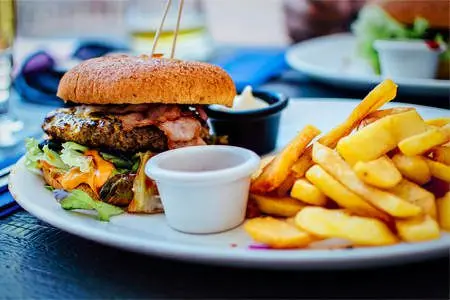
The incidence of diabetes mellitus is associated with a violation of the absorption of glucose by the body. Disruption of endocrine functions is so common that diabetes has become rampant. Morbidity rates among children and adults have reached epidemic levels. According to 2019 data, about 300 million people suffer from diabetes on Earth.
The disease is always chronic in nature and can be complicated by the development of various severe complications – cardiovascular, renal disorders, visual impairment, up to complete loss. Improper nutrition definitely affects the risk of gradual development of diabetes. The introduction of certain foods into the diet contributes to an increase in glucose levels, insulin deficiency, and the appearance of inflammatory phenomena.
We want to dwell on some seemingly harmless foods that should be excluded so as not to aggravate the course of prediabetes and diabetes.
Why are carbohydrates important for diabetic patients?
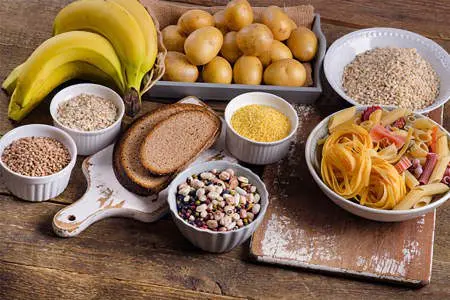
Providing the human body with the necessary energy and building material for new cells occurs at the expense of fats, carbohydrates and proteins. All these macronutrients are delivered to the body along with food. Carbohydrates have the strongest effect on sugar levels.
During digestion, carbohydrates are broken down into monosaccharides. The formed glucose is actively absorbed into the bloodstream and affects the overall sugar level. Fiber, which is also a carbohydrate, is indigestible and cannot be absorbed. This feature does not affect the increase in sugar levels, which is very important in diabetes.
To determine the “net” carbohydrate content of a food, subtract fiber from the total carbohydrate content. For example, one serving of mixed vegetables contains 10 grams of carbohydrates, of which 4 grams are fiber. In this case, we can say that 6 grams is the net content of carbohydrates.
An excessive increase in blood glucose in diabetic patients can occur with a large intake of carbohydrates from different foods. Constantly high sugar can damage nerve fibers, the walls of blood vessels, negatively affect the tissues of the heart, kidneys and other internal organs.
As a rule, diabetics understand that they must control their diet in order to avoid spikes in sugar. Failure to follow dietary recommendations increases the likelihood of worsening health conditions. Endocrinologists recommend eliminating or significantly reducing the presence of dangerous foods in the diet, which we will discuss in detail below.
1. Sweet drinks

Patients with diabetes should avoid sweetened drinks. They contain a huge amount of carbohydrates. For example, one can of sweet soda (approximately 354 ml) releases 38 grams of these organic substances. Equal servings of sweet tea and lemonade lock in 36 grams of carbs from added sugar.
Fructose is one of the main elements of sugary drinks. Its presence greatly increases the likelihood of insulin resistance and diabetes. Drinking sugary drinks contributes to complications of diabetes, such as fatty liver. [1], [2].
A high concentration of fructose in sweetened drinks causes disturbances in physiological metabolism in tissues. As a result of metabolic disorders, extra pounds appear in the abdomen, the indicator of “bad” cholesterol, triglycerides increases.
One of the studies on the effects of fructose was conducted in obese or overweight adults. The participants in the experiment were offered 25% of their calories in the form of high fructose drinks. As a result, increased insulin resistance, an increase in the volume of adipose tissue in the waist area, a slowdown in metabolism and a deterioration in cardiac activity were established. [3], [4].
To control blood sugar, prevent diabetes, it is better to opt for purified or mineral water, unsweetened iced tea.
Carbonated and non-carbonated sugary drinks contain a lot of carbohydrates, which lead to an increase in blood glucose levels. A large amount of fructose is directly related to the risk of obesity and the appearance of insulin resistance.
2. Trans fats
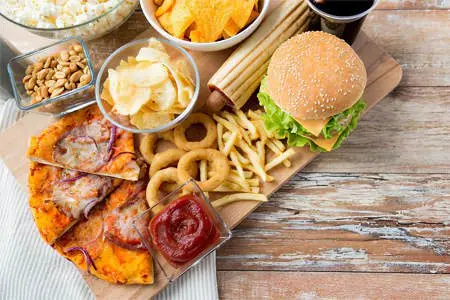
Trans fats used in the food industry are extremely unhealthy. They are obtained by combining hydrogen with unsaturated fatty acids. This chemical method is the stabilization of fats.
The list of products to which trans fats are added is quite extensive – these are margarines, spreads, peanut butter, frozen convenience foods, cream. In the confectionery and bakery industry, they are used to extend the shelf life of muffins, crackers, and other sweet pastries.
The negative effect of trans fats is not expressed in an increase in blood sugar levels. They cause insulin resistance, inhibit the synthesis of “good” insulin, contribute to the appearance of symptoms of inflammation and disruption of arterial blood flow. These manifestations are extremely dangerous in diabetes mellitus, as they provoke the development of cardiac disorders, up to insufficiency. [5], [6], [7].
Given all the negative effects of trans fats on the human body, most countries have banned their use in the food industry. For example, the United States, by decision of the FDA, in 2015 began a three-year program to remove trans fats from the food market.
To find out if trans fats are present in a product, you should carefully study the label. If a formula lists an ingredient with the term “partially hydrogenated”, please refrain from purchasing.
Unsaturated fats that have been chemically treated to stabilize them are called trans fats. They are dangerous for humans, as they provoke inflammatory processes, help the formation of fatty deposits in the abdominal space, lead to insulin resistance and the development of heart disease.
3. Rice, pasta, white bread
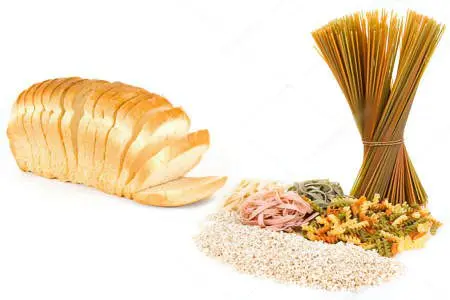
All types of white bread, pasta and rice are specially processed foods with a high concentration of carbohydrates. Patients with type I and II diabetes are advised not to eat bread and flour products made from refined flour, as they increase blood glucose levels. [8].
The restrictions also apply to other products made from wheat. Observations have shown that eating gluten-free pasta causes an increase in blood sugar. Rice-based varieties cause the highest glucose levels [9].
Another independent study found that eating high-carbohydrate white breads causes decreased brain activity and mental impairment in patients with type XNUMX diabetes. [10].
Processed flour products made from white flour contain virtually no fiber. This greatly increases the absorption of glucose. If you replace white bread with bread of a different variety, which has more fiber, then there is a decrease in the concentration of sugar in diabetic patients. In addition, patients have a significant decrease in blood pressure and cholesterol. [11].
Rice, pasta, and white bread are high in carbohydrates and very low in fiber. Such a composition of products inevitably causes an increase in blood sugar. Introducing fiber-rich foods into your diet helps to achieve the opposite effect.
4. Fruit Flavored Yogurt

Plain fermented milk yogurt is a great snack option for people with diabetes. But not with fruit additives. For the production of flavored yogurt, skim milk, fruit additives, sugar are used, which explains the excessively high carbohydrate content.
A standard cup of fruit yogurt (245 grams) holds 47 grams of sugar. Almost 81% of all the calories of the product come from the indicated amount of sugar. Some people think that frozen yogurt can replace ice cream. This opinion is erroneous, since yogurt can contain the same amount of sugar, and even more in several varieties.
Diabetics should not choose yogurts that are too high in sugar. Instead, it is better to buy a regular fermented milk product without fruit additives. Whole milk yogurt does not increase blood sugar levels, promotes healthy peristalsis and helps maintain normal body weight [12].
Yoghurts with fruit additives contain almost no fat, but they always have a lot of sugar. The use of such a product leads to an increase in blood glucose parameters. To improve the health of diabetic patients, it is better to opt for plain, unflavored whole-milk yogurts. This helps control the disease.
5. Sweet breakfast cereal
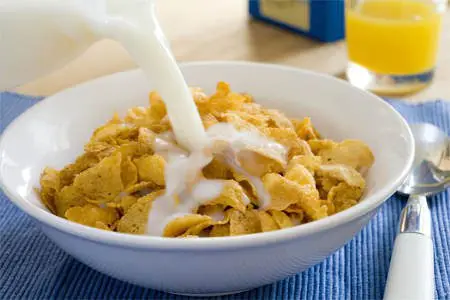
For diabetics, sugary cereal is the most unacceptable breakfast option. Some manufacturers indicate on the box that cereal is a processed product and may be harmful to health. This is due to the high content of carbohydrates and the virtual absence of protein. It is the protein in the products that provides nutritional value, allows you to satisfy the feeling of hunger and maintain an optimal level of glucose in the blood.
Even if the advertisements try to convince the “healthy composition” of breakfast cereals, they should not be consumed by diabetic patients. 55 grams of muesli contains 30 grams of digestible carbohydrates, and raisins – 41 grams, while only 7 grams of protein. These figures are disastrously large for one serving of dry breakfast.
To control diabetes, stabilize blood glucose levels and eliminate hunger, it is better to choose protein foods for breakfast, rather than cereals.
Patients with diabetes should refrain from eating sugary cereals. The product contains too little protein and extremely high carbohydrates. An ideal breakfast option is protein foods that help control sugar levels and eliminate hunger.
6. Flavored coffee drinks

The health benefits of natural coffee have been proven for a long time. The advantage is its ability to prevent the development of diabetes [13], [14].
These beneficial qualities do not apply to coffee drinks with flavored additives. They can be considered by nutritionists as liquid desserts that do not bring any benefit to a person.
Studies of the activity of the human brain have shown that it does not perceive liquid and solid food in the same way. High-calorie drinks cannot compensate for the volume of solid foods, which can cause weight gain.
Flavored coffee drinks are high in carbohydrates. Even if there is a “light” mark on the package, the product still has a significant carbohydrate composition, which means that it inevitably increases blood sugar levels. For example, a regular serving of 454 ml caramel frappuccino contains 67 grams of carbohydrates, and a light caramel frappuccino of the same volume contains 30 grams.
If you have diabetes, choose natural coffee or espresso with the addition of 1 tablespoon of heavy milk cream. Proper coffee will not only help control sugar, but will also serve as a prevention of weight gain.
Flavored coffee drinks are rich in liquid carbohydrates. The use of such drinks does not give a feeling of satiety, provokes an increase in blood sugar levels.
7. Maple syrup, honey, agave nectar

In an effort to control glucose in their body, people with diabetes try to exclude white sugar, sweet pastries, and confectionery products from their diet. In this case, an attempt is made to replace these products with another source of glucose.
Some sources offer “natural” substitutes such as honey, maple syrup, agave nectar, or brown sugar. Let’s just say that all these products can lead to jumps in blood glucose.
Recommended “healthy” sweeteners do not go through aggressive chemical processing, but contain a huge amount of carbohydrates, sometimes higher than ordinary white sugar. For example, consider the carbohydrate indicators in one tablespoon of popular natural sweeteners:
White sugar – 12,6 grams.
Maple syrup – 13 grams.
Agave nectar – 16 grams.
Honey – 17 grams.
In one study, prediabetic patients showed increases in inflammatory markers and blood sugar levels, regardless of whether they consumed the same doses of white sugar and honey. [15].
People with diabetes are best off avoiding all forms of sugar. Using natural, low-carb sweeteners is the most viable option.
Agave nectar, honey and maple syrup are not chemically processed like white sugar. However, the high content of carbohydrates in these products leads to an increase in glucose in the body, the activity of inflammatory markers and impaired insulin synthesis.
8. Dried fruits
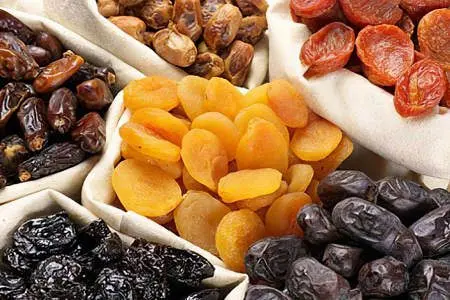
Fresh fruits are an essential part of the therapeutic diet for people with diabetes. They contain the most important vitamins, minerals, including vital vitamin C and potassium. During the drying process, water is removed from the fruit and a significant concentration of valuable elements is observed. This also applies to sugar – its amount increases significantly.
For example, one serving of grapes contains only 27 grams of carbohydrate, of which 1 gram is fiber. The same amount of raisins has 115 grams of carbohydrates, including 5 grams from fiber. From this it follows that in raisins there are almost four times more carbohydrates than in grapes. If you compare other types of dried fruits with fresh fruits, the result will be similar.
Patients with diabetes should not give up fruits completely. It is best to opt for fruits with a low sugar content, fresh berries. Even one small apple can bring significant health benefits without causing a rise in blood glucose levels.
In the process of drying in dried fruits, a concentration of trace elements and vitamins occurs. At the same time, the amount of carbohydrates also increases. For people with diabetes, it is better to choose fresh fruits with a low sugar content, which will help control the course of the disease and blood counts.
9. Ready snacks

For the production of crackers, muffins, pretzels, refined flour is used, preservatives are added for longer storage in plastic packaging. Many people prefer these products as a quick snack, but this is completely the wrong choice.
Packaged snacks contain a huge amount of fast-digesting carbohydrates with a deficiency of valuable, nutrients. After eating, these foods cause spikes in blood sugar levels.
For example, consider the carbohydrate content in the same portions of many favorite snacks:
Salted crackers – 21 grams of carbohydrates, of which 1 gram of fiber.
Pretzels – 22 grams of carbohydrates, of which 1 gram is fiber.
Graham crackers (whole grain cookies) – 21 grams of carbohydrates, of which 1 gram is fiber.
The danger of packaged snacks is that the amount of carbohydrates on the package is significantly underestimated. A study of the correspondence between the composition of products and information on the label showed that the actual amount of carbohydrates is almost 8% higher than the declared one. [16].
As a snack between meals, it is better to eat nuts, low-calorie cheese or vegetables. They will bring more benefits and help satisfy the feeling of hunger.
Packaged snacks are made from refined flour and subjected to certain processing. These types of foods actively increase blood glucose levels and can harm people with diabetes.
10. Fruit juice
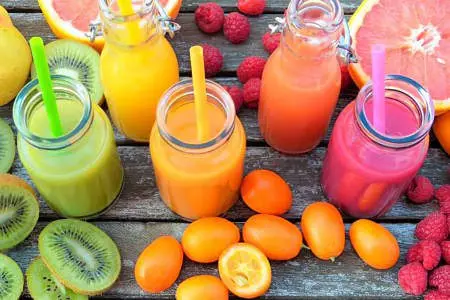
Most fruit juices are considered beneficial for the human body. They are introduced into the diet to provide vitamins and nutrients. We should not forget that fruit juices can contain as much sugar as carbonated, sweetened drinks.
The analysis showed that the same portions (250 ml) of apple juice and sweetened soda contain 24 grams of sugar. In the same volume of grape juice – 32 grams of sugar.
Fruit juice is a source of fructose, which promotes insulin resistance, obesity and cardiovascular disease. [17].
Patients with diabetes are better off drinking water acidified with a slice of lemon. Such a drink contains less than 1 gram of carbohydrates.
Unsweetened fruit juices can hold as much sugar as carbonated sweetened drinks. Fructose contributes to insulin resistance, the development of heart disease, and can cause weight gain.
11. French fries
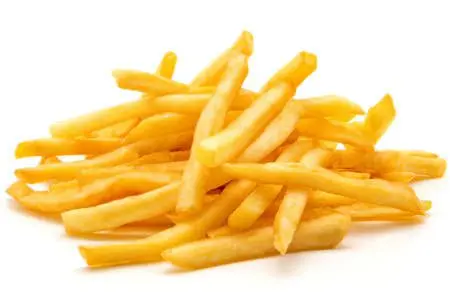
French fries are included in the list of foods with a significant concentration of carbohydrates that should be removed from the usual diet for diabetes. One medium-sized unpeeled potato contains approximately 37 grams of carbohydrates, including 4 grams of fiber.
After peeling and frying in vegetable oil, potatoes not only increase blood sugar. Deep frying causes changes in the composition of root vegetables. Aldehydes and substances dangerous to the body are found in French fries, causing inflammatory reactions that contribute to the development of dangerous diseases [18], [19].
Medical studies have shown that excessive consumption of french fries and deep-fried foods increases the likelihood of developing heart disease and cancer. [20], [21], [22], [23].
A small amount of sweet potatoes can be an alternative to the usual potatoes.
Infatuation with french fries not only causes an increase in blood glucose levels. Frying root vegetables in vegetable oil leads to the formation of harmful substances that cause symptoms of inflammation and increase the risk of heart and oncological pathologies.
Instead of a conclusion
Patients with diabetes should avoid foods that can worsen their health. It is not as difficult as it seems at first glance. The main condition is to eliminate harmful fats, liquid calories, foods high in processed carbohydrates from the usual diet. This will help maintain health, maintain optimal blood sugar levels and prevent the development of serious complications.









